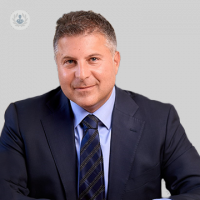Immunotherapy: What to expect and how to manage side effects
Written in association with:Immunotherapy is a groundbreaking form of treatment that works by enhancing your body’s natural immune system to fight diseases, particularly cancer. Unlike traditional treatments like chemotherapy or radiation, which directly target cancer cells, immunotherapy empowers your immune system to recognise and combat cancer cells as it would a virus or infection. If you’re considering immunotherapy, understanding how it works and what to expect can help you make an informed decision.
Leading medical oncologist Dr Dionysis Papadatos-Pastos explains all you need to know.

How does Immunotherapy work?
Immunotherapy leverages the immune system, which is your body’s natural defence against foreign invaders, including infections, viruses, and abnormal cells. Typically, immune cells called T-cells identify and destroy these abnormal cells. However, cancer cells are often able to hide from the immune system or suppress its response, allowing them to grow unchecked. Immunotherapy counteracts these tactics, effectively “retraining” the immune system to detect and destroy cancer cells more effectively.
There are various types of immunotherapy, including immune checkpoint inhibitors, CAR T-cell therapy, and cytokine therapy. For example, immune checkpoint inhibitors work by blocking proteins that prevent T-cells from recognising and attacking cancer cells. CAR T-cell therapy, another approach, involves modifying a patient’s T-cells in the lab to enhance their cancer-fighting abilities. Each type of immunotherapy works differently, but all aim to strengthen your immune response against cancer.
What conditions can immunotherapy treat?
Immunotherapy is used primarily for certain types of cancers, including melanoma, lung cancer, lymphoma, and bladder cancer. In recent years, research has expanded its application to other cancers and diseases. Not every cancer responds to immunotherapy, and it is most commonly used for advanced cancers that may not respond well to conventional treatments. Your oncologist may consider immunotherapy based on your specific cancer type, its stage, and your overall health condition.
For patients with early-stage cancer, immunotherapy is typically not the first-line treatment, as it is most effective in later stages. It may also be used when cancer has returned after initial treatment. In certain cases, it may be combined with other treatments, such as chemotherapy or radiation, to maximise effectiveness.
What are the common side effects of immunotherapy?
As with any treatment, immunotherapy comes with potential side effects, though they can vary widely. Unlike chemotherapy, which affects the entire body, immunotherapy side effects are usually related to the immune system's heightened activity. Common side effects include fatigue, mild fever, and skin reactions like rash or itching. These are often manageable and may lessen as your body adjusts to the treatment.
More serious side effects can arise if the immune system starts attacking normal, healthy cells, a condition known as autoimmunity. This may lead to inflammation in various organs, such as the lungs (pneumonitis), liver (hepatitis), or colon (colitis). Such reactions are usually rare but may require treatment with steroids or other medications to suppress the immune response. Your healthcare team will monitor you closely to manage any side effects promptly.
How is immunotherapy administered?
Immunotherapy is usually given intravenously, meaning it’s delivered directly into the bloodstream through an IV line. Depending on your treatment plan, you may receive immunotherapy once every few weeks, with each session lasting several hours. Unlike chemotherapy, immunotherapy is often administered in cycles, allowing time for the body to rest between treatments.
Some newer forms of immunotherapy, such as CAR T-cell therapy, require an initial phase where your own cells are collected and modified before being reintroduced to your body. Your oncologist will discuss the specifics of your treatment schedule and what each session will involve, so you know what to expect during the process.
What results can I expect from immunotherapy?
The effectiveness of immunotherapy can vary from person to person. Some patients experience significant improvement, with their cancer shrinking or even going into remission. Others may not respond as well, and for a subset of patients, immunotherapy may even help to manage cancer as a chronic condition. Unlike more direct treatments, immunotherapy often takes time to show results, so patience is essential.
Response rates depend on various factors, including the type of cancer, stage of disease, and the specific type of immunotherapy used. Some patients experience long-lasting benefits even after treatment stops, as their “retrained” immune system continues to guard against cancer. Your healthcare team will monitor your progress with regular scans and tests to track the treatment's effectiveness.
Immunotherapy offers a powerful new approach in cancer treatment, with the potential to provide long-term control over the disease for many patients. Understanding how it works, the potential side effects, and the process of treatment can help you decide if immunotherapy may be the right step forward for you.
If you would like to book a consultation with Dr Papadatos-Pastos, visit his Top Doctors profile today.


